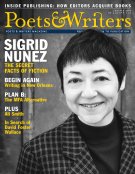Most poets are probably less familiar with William Butler Yeats’s play The Countless Cathleen than with his poetry collection The Wind Among the Reeds. But this dramatic work, performed at Dublin’s Irish Literary Theatre in 1899, is illustrative of a rich tradition of poets, including Dylan Thomas, Gertrude Stein, and T.S. Eliot, all of whom wrote, and sometimes performed and directed, plays.
Not bound by the conventional narrative structure of traditional plays, or the pressures of the commercial success that large theaters require, the poets are free to experiment with form and to redefine drama as a genre.
In the second half of the twentieth century, a number of poets’ theater programs, including the Poets’ Theatre, which was established in Cambridge, Massachusetts, in 1950, and staged plays by John Ashbery, James Merrill, Frank O’Hara, and Richard Wilbur, provided venues for work written by poets for the stage. Now, a new generation of poets’ theater programs—in California, North Carolina, and Washington, D.C.—are raising their curtains for plays by poets.
The annual Poets’ Theater Jamboree, presented by Small Press Traffic (SPT), a literary arts center founded in San Francisco in 1974, will be held from January 13 to January 27 at the California College of Arts. This year’s festival, which serves as the nonprofit organization’s fundraiser, will feature approximately twenty-five plays written and performed by poets. Past participants have included Kevin Killian, Camille Roy, Leslie Scalapino, Gary Sullivan, and K. Silem Mohammad.
Not bound by the conventional narrative structure of traditional plays, or the pressures of the commercial success that large theaters require, the poets are free to experiment with form and to redefine drama as a genre. “It’s not just about narrative, but language. People take it in whatever direction suits them,” says SPT executive director Elizabeth Treadwell. “It’s definitely something that is kind of broad and [continues to be] invented as it goes along. That’s hopefully part of the charm.”
Some performers bring homemade props and read from scripts, having rehearsed their work only a handful of times, while other productions are more polished, presented after long technical rehearsals in the theater.
“We get the biggest crowds of the year for the Poets’ Theater Jamboree,” says Treadwell, who adds that the 132-seat venue often sells out during the festival. “Everyone is doing this for the pure pleasure of language and performance, and the audience really responds to that.”
Poets Ken Rumble and Chris Vitiello recently organized the Theater of Consecutive Thinking, a festival that will debut in June in the Chapel Hill area of North Carolina. The event will be held the same week as the nearby Carrboro Poetry Festival, and will feature new productions of plays written by Stein, Jack Spicer, and Kenneth Koch, as well as plays written specifically for the festival by local poets.
“I think what we really are interested in doing is providing a collaborative space for poets, actors, musicians, and artists,” says Rumble. Although the festival’s participants will be predominantly poets, Rumble and Vitiello hope to collaborate with local theater companies and the drama departments at the University of North Carolina, Chapel Hill, and Duke University as well as with local artists on set design and other production elements.
A little farther north, in the Washington, D.C., area, poet-playwright Magus Magnus is planning a series of poets’ theater events for spring 2007. Sponsored by the Alexandria Performing Arts Association, the festival, which Magnus hopes to hold annually, will be held in a variety of venues, such as art galleries and coffee shops, and will feature staged readings and short performances by poets Thalia Field, Kevin Thurston, Ric Royer, and others
Anna Mantzaris is a journalist in New York City.








